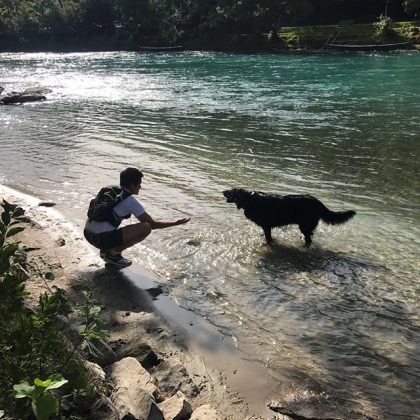Meet the Editor: Q&A with Cinzia Cantacessi, Cambridge Veterinary School
Welcome to our “Meet the Editors” series, where we interview the editorial team about their work and their relationship to the journal. In this post we meet Dr Cinzia Cantacessi, Editor for Parasitology.
Firstly, what is your current job title both within Parasitology and outside of the journal? Where are you based in the world?

I am a Professor of Parasite Infection Biology at the Department of Veterinary Medicine of the University of Cambridge, and an Editor of Parasitology.
In a few sentences, please describe the focus of your work. Which parasites do you study? What is the goal of your research? What approaches do you use in your work?
Together with my group, we are focused on gaining a better understanding of host-parasite interactions, and particularly of the crosstalk between helminth parasites of humans and animals and the vertebrate gut microbiome. Over the last decade, there has been a wealth of evidence pointing toward the existence of communications between these organisms, and we believe that deciphering such interactions will lead us to the identification and development of novel strategies to combat parasitic diseases and the pathology that they cause. We mostly apply -omics technologies to our studies, but are also fortunate to collaborate with an extensive network of scientists with whom we also run ‘wet-lab’ experiments.
When did you first become interested in parasitology as a field? Did a particular teacher or mentor direct your career path?
Absolutely. I studied Veterinary Medicine at the University of Bari (Italy). In my third year, I attended the Veterinary Parasitology course taught by Professor Domenico Otranto, and became utterly and completely fascinated with the discipline. Meeting Domenico and his infectious enthusiasm for everything Parasitology shaped the course of my career. I also particularly loved the sense of collegiality in our discipline, so I decided to stay! And I certainly never looked back.
How did you first become familiar with the Parasitology journal?

This is also a story related to Domenico, my first mentor. In Italy, in order to complete our Veterinary Medicine studies, we have to undertake a short research project in a chosen discipline. It goes without saying my choice was Parasitology. Once the project was completed, Domenico encouraged me to write up the results in a research article, to be submitted to an international peer-reviewed journal for publication. The manuscript, “Nematode biology and larval development of Thelazia callipaeda (Spirurida, Thelaziidae) in the drosophilid intermediate host in Europe and China”, was then submitted and published in the Parasitology journal – my first ever paper and the very first journal I became acquainted with! Parasitology has had a special place in my heart ever since…
What is the best part of editing for Parasitology?
For me, it definitely is the chance and privilege to get a ‘preview’ of the latest advancements in our field.
Do you have any advice for those submitting to Parasitology?
My piece of advice would be that, if the authors are not too sure of whether their article might be a good fit for Parasitology, as well as whether the journal itself might be a good vehicle for their article, to not hesitate to contact one of the Editors for an informal chat and discuss your thoughts or concerns.
What advice would you give to early career researchers who are just starting out in parasitology as a field?
Surround yourself with supportive mentors, attend as many conferences and meetings as you can and never stop networking! The parasitology field is made of a relatively small community of researchers, and it is almost inevitable to meet the same people at several stages of one’s career, whether as a student, early career researcher or established PI.
Parasitology is an important specialist journal covering the latest advances in the subject. It publishes original research and review papers on all aspects of parasitology and host-parasite relationships, including the latest discoveries in parasite biochemistry, molecular biology and genetics, ecology, and epidemiology in the context of the biological, medical and veterinary sciences.






